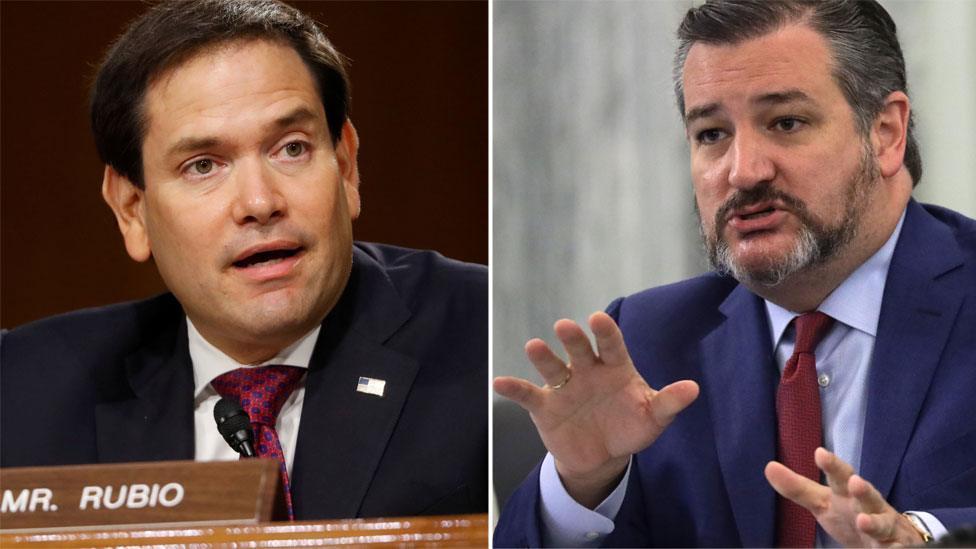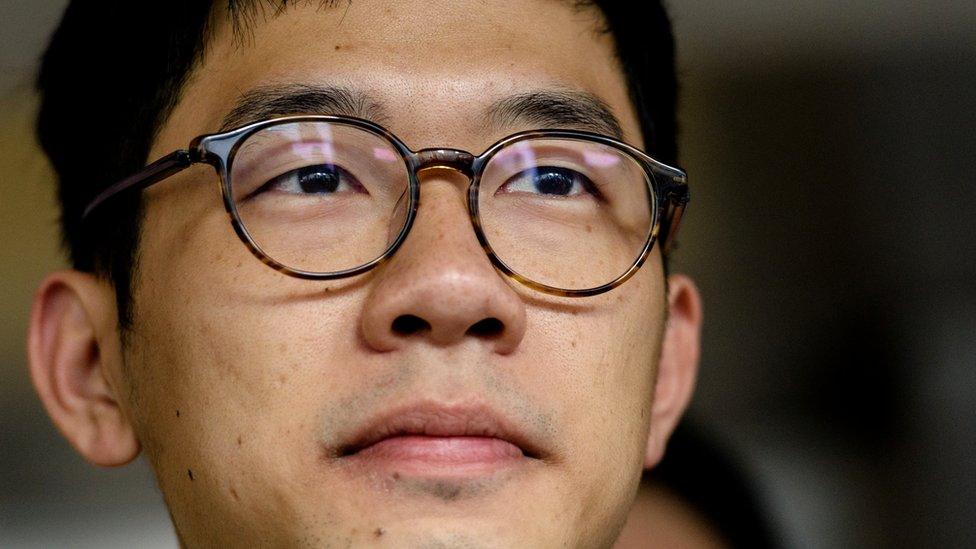Trump ends preferential economic treatment for Hong Kong
- Published
'Their freedom has been taken away'
US President Donald Trump has signed an order to end preferential economic treatment for Hong Kong, after China enacted a new security law there.
Hong Kong would be treated "the same as mainland China", Mr Trump said. He also signed a law to impose sanctions on officials who cracked down on rights.
China has strongly criticised the move, vowing to take retaliatory action.
The US sees the security law as a threat to the freedoms Hong Kong has enjoyed under a 1984 agreement.
That special status was agreed between China and Hong Kong's former colonial power, the UK, before sovereignty was returned to Beijing in 1997.
The new security law - which outlaws criticism of China's government - is the most sweeping change to the political landscape of Hong Kong since then.
Tea, drugs and war: Hong Kong's British history explained
What did President Trump say?
Speaking in the Rose Garden on Tuesday, Mr Trump said his executive order would end preferential treatment for Hong Kong.
"No special privileges, no special economic treatment and no export of sensitive technologies," said the president, who first announced in May that his administration would begin paring back the territory's special status.
He also told reporters he had signed the Hong Kong Autonomy Act, which passed unanimously in Congress earlier this month.
"This law gives my administration powerful new tools to hold responsible the individuals and the entities involved in extinguishing Hong Kong's freedom," Mr Trump told the news conference.
After being questioned by a journalist, the president said he had no plans to speak to Chinese President Xi Jinping.
He also told reporters that "we hold China fully responsible for concealing the [coronavirus] and unleashing it upon the world".
Mr Trump's own administration is under scrutiny for its response to the pandemic. The US has 3.4 million recorded cases, the highest in the world, and more than 136,000 deaths.
The president's policy address digressed into a lengthy political attack on his Democratic presidential challenger, Joe Biden, ranging from trade and immigration to policing and climate change.
Many Hong Kong residents are worried the new security law means the "one country, two systems" principle no longer exists
How did China respond?
China's foreign ministry condemned the latest US moves, saying they were a "gross interference" in its domestic affairs.
In a strongly-worded statement, it said the country would also impose retaliatory sanctions against US individuals and entities to "safeguard China's legitimate interests".
"The US attempt to obstruct the implementation of the national security law for Hong Kong will never succeed," the statement said.
"We urge the US side to correct its mistakes, refrain from implementing the act and stop interfering in China's internal affairs in any way. China will firmly respond if the US goes ahead."

Hong Kong's new security law
THE US MOVE: Should US firms be worried about Hong Kong sanctions?
RISING TENSIONS: The Hong Kong crisis and the new world order
THE NEW LAW: What it is and why Hong Kong is worried
WHAT COULD HAPPEN: Life sentences for breaking the law and more
ELSEWHERE IN THE REGION: What might happen next in the South China Sea?

Perception is reality

It was not a matter of if, but when. Scrapping Hong Kong's special status will mean companies based there will now have to evaluate what this means for them.
Hong Kong is a re-exporting hub, which means that goods that go through Hong Kong to the US but have come from somewhere else - like China for instance - have avoided the tariffs the US has slapped on China.
Now that Hong Kong's special status is gone - mainland Chinese companies may look for another place to send their goods - which would see Hong Kong's port and logistics businesses suffer.
And how much of an impact will this have on American and multinational companies using Hong Kong as a regional hub? Well, as one business consultant told me - the structural reasons for why a company would use Hong Kong as a hub are still there - low tax rates, good geographic location, convertibility of currency.
But perception is reality - and if the perception is that doing business in Hong Kong has become so much more onerous - why not decamp to mainland China or Singapore instead?

What is going on with US-China relations?
Washington-Beijing ties have become increasingly frayed in recent months.
With Mr Trump facing an uphill battle for re-election this November, he and Mr Biden have accused each other of being weak on China.
On Monday, the administration condemned China's military build-up in the South China Sea, accusing it of bullying neighbours.
Last Friday, Mr Trump told reporters on Air Force One that a "phase two" trade deal with China was in doubt because of its handling of coronavirus, which he called the "plague".
Jimmy Lai: China's security law "spells the death knell for Hong Kong"
The US also officially withdrew last week from the World Health Organization, which Mr Trump had accused of being beholden to China.
Last week, too, the Trump administration announced sanctions against Chinese politicians who it says are responsible for human rights violations against Muslim minorities in Xinjiang.
- Published13 July 2020

- Published13 July 2020
